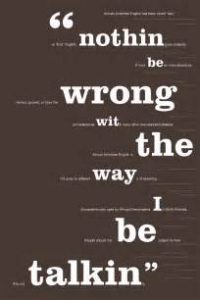Background:
There are several theories about the origins of African American English. One prominent explanation traces this linguistic system’s roots to the ships that carried enslaved people out of Africa. Onboard, people of diverse cultures, languages, and backgrounds sought a common language. Another explanation suggests that African American English developed in the United States, when African slaves learned English from indentured servants who worked alongside them. The variety of English spoken by these servants was somewhat different from the British colonists’ way of speaking, and the particular linguistic features were passed along.
Scholars agree that this dialect is not an informal, incorrect, or improper form of Standard American English. African American English, also known as Ebonics and African American Vernacular English, has a well-developed system of grammar, consistent linguistic and phonetic rules, and an important social function.
African American English and Education:
The role of African American English in education was highlighted during the Oakland school board controversy in 1996. At that time, Oakland, California had a majority black population, and the local school board wanted to integrate African American English into their classroom language instruction. They called Ebonics the genetically based primary language of their students, and hoped to teach it as a second language in order to strengthen students’ Standard English skills. After a month of local and nationwide debate, during which figures such as Maya Angelou, Rev. Jesse Jackson, and the Clinton Administration offered their opinions, the school board walked back much of the proposal, including the claim that African American English was a genetically based language. The board’s new resolution emphasized the importance of respecting students’ home linguistic traditions as they strove to help children master Standard English in the classroom.
Among linguists and educators, best practices for inclusive, affirmative, and effective language instruction are still contested. Some individuals believe that it is oppressive to teach Standard English at all. From this perspective, educators demonstrate their equal valuing of all languages and dialects when they allow their students to speak and write in their home languages while in school. Other scholars challenge this point by highlighting the reality that children are growing up in a racist world that will discriminate against them for failing to use Standard English effectively. From this perspective, educators have an obligation to teach Standard English, so as to prepare them to succeed in a grossly intolerant society. Many teachers and scholars advocate that children learn code-switching in their schools. In this process, educators recognize and appreciate linguistic diversity in their students as they help children discern the best times to use “home” and “school” languages. As students learn how to use different kinds of language effectively, they should be encouraged to be adaptable and to make thoughtful decisions in their writing and speech.
Resources for Educators:
While this section offers a brief overview of African American English and its role in education, interested teachers, students, and administrators can find a myriad of useful related resources online. Educators can access lesson plans and curriculum guides, scholarly articles and accessible websites, books, workshops, and conferences. Those compiled here are especially helpful, extensive and clear. Each of these sources link viewers to further reading.
http://www.pbs.org/speak/education/curriculum/high/aae/#aaebrief
This PBS resource is extremely comprehensive. It provides excellent background information, lesson plan ideas, and connections to more resources.
http://w600writtenenglishes.wixsite.com/written-englishes/questions
This source was developed by the students of Dr. Kim Brian Lovejoy at Indiana University. It provides information about linguistics and multiculturalism that is geared toward practical application by teachers in the classroom. It also includes an annotated bibliography for further reading.
https://charityhudleymallinson.com/
This incredibly thorough blog is packed with information on English language variation for educators. The authors of the website also have created books and workshops on the topic that are accessible to teachers.
